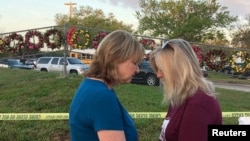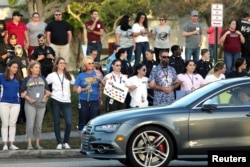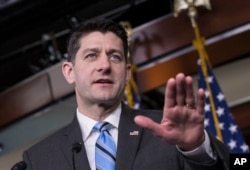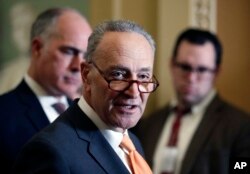Students who survived one of the deadliest mass shootings in U.S. history returned to classes Wednesday, as federal and state lawmakers continue to debate how to prevent young people from losing their lives in what they all agree should be the safe confines of the nation's schools.
There had been no classes at Marjory Stoneman Douglas High School in Parkland, Florida, since a gunman killed 17 people there two weeks ago. As students returned, they were greeted by throngs of well-wishers passing out flowers and holding signs, one saying "free kisses."
But students also passed through cordons of police officers armed with military-style rifles, having an unsettling effect on some.
"This is a picture of education in fear in this country," said David Hogg, a student survivor who has emerged as a leading voice in the students' movement to control assault weapons. "The [National Rifle Association] wants more people like this, with that exact same firearm, to scare more people and sell more guns."
Broward County Schools Superintendent Robert Runcie said grief counselors are also on campus to provide "a lot of love, a lot of understanding" and to help students "ease back" into their routines.
But grim reminders of the massacre were evident. The freshmen building where the killings occurred remains cordoned off. And Wednesday's classes did not begin until fourth period, so students and teachers could first reunite with the people they were with when the shootings occurred.
"It's not how you go down. It's how you get back up," said 17-year-old junior Casey Sherman, who said she stayed up late Tuesday night to prepare for the March 14 national school walkout against gun violence.
Gun control
The massacre has reignited the long-running debate over gun laws. House Speaker Paul Ryan told reporters Tuesday a "gap" in the nation's background check system for gun buyers must be filled, and called for the implementation of "sweeping mental health reform."
"These are the kinds of things that we are going to be discussing with our members, with the Senate, and with the president," Ryan said.
What Ryan and other Republican lawmakers have not proposed is a ban on guns, including semi-automatic AR-15 assault rifles like the one used in the Florida school attack.
"We shouldn't be banning guns for law-abiding citizens. We should be focusing on making sure that citizens who should not get guns in the first place don't get those guns," Ryan said.
The NRA and other gun-rights groups are strongly opposed to preventing Americans from owning certain types of weapons. As such, Republican leaders in Congress are unlikely to support U.S. President Donald Trump's proposals to raise the minimum age for buying semi-automatic rifles, ban "bump stocks" that enable semi-automatic rifles to fire hundreds of rounds per minute, and have more stringent background checks.
Trump, who has also called for teachers to be allowed to carry firearms in the classroom, said after meeting Monday with the nation's governors that "half of you are so afraid of the NRA. If [the NRA] is not with you, we have to fight them every once in a while."
Trump was set to convene a bipartisan group of legislators Wednesday at the White House to discuss school safety.
For years, Democrats have pressed for a universal background check system, including investigations into online and gun show purchases.
Senate Democratic Leader Chuck Schumer said Monday that if Congress passes only a bipartisan bill to strengthen the National Instant Criminal Background Check System, known as "Fix NICS" legislation, "it would be an abject failure and a dereliction of duty."
Many House Democratic members want to reinstate an assault weapons ban that expired more than a decade ago, but House Republican leaders maintain the Senate has the responsibility to take the next steps.
Florida action
The mass shooting has pushed the Florida state legislature to consider measures to ensure school safety. The victims' relatives pressured state lawmakers Tuesday with emotional testimony, prior to a House committee approving a bill to raise the age limit to purchase long guns from 18 to 21.
The measure would also create a program that would allow teachers to carry concealed weapons in classrooms if their school districts allow it, and if they are properly trained and deputized by the local sheriff's office.
School superintendent Runcie is opposed to arming teachers, and Hogg believes the idea is misguided.
Florida Governor Rick Scott said he hopes legislation is passed before state lawmakers adjourn March 9. Scott's proposals did not include arming teachers, but he declined to say if he would veto a bill if it includes that provision.


















